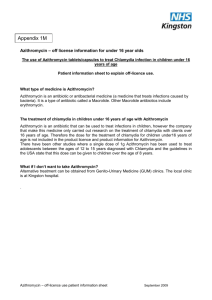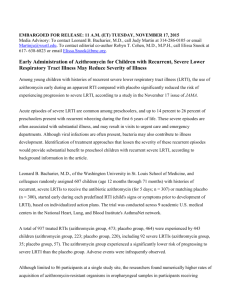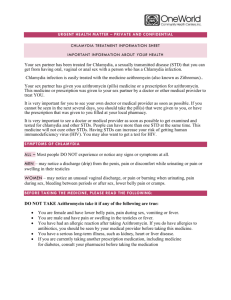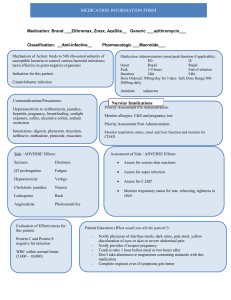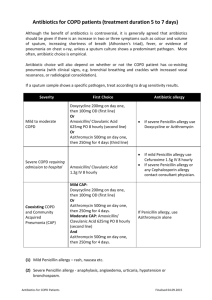Azithromycin and Chronic Obstructive Pulmonary Disease (COPD) 290421 doc FINAL
advertisement
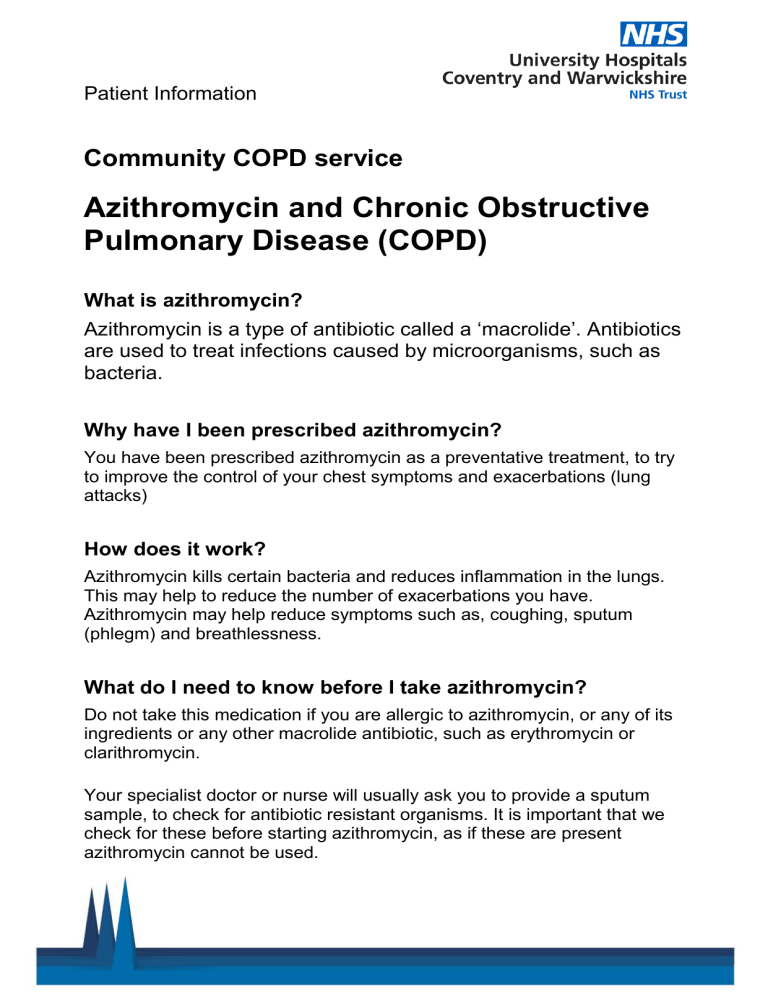
Patient Information Community COPD service Azithromycin and Chronic Obstructive Pulmonary Disease (COPD) What is azithromycin? Azithromycin is a type of antibiotic called a ‘macrolide’. Antibiotics are used to treat infections caused by microorganisms, such as bacteria. Why have I been prescribed azithromycin? You have been prescribed azithromycin as a preventative treatment, to try to improve the control of your chest symptoms and exacerbations (lung attacks) How does it work? Azithromycin kills certain bacteria and reduces inflammation in the lungs. This may help to reduce the number of exacerbations you have. Azithromycin may help reduce symptoms such as, coughing, sputum (phlegm) and breathlessness. What do I need to know before I take azithromycin? Do not take this medication if you are allergic to azithromycin, or any of its ingredients or any other macrolide antibiotic, such as erythromycin or clarithromycin. Your specialist doctor or nurse will usually ask you to provide a sputum sample, to check for antibiotic resistant organisms. It is important that we check for these before starting azithromycin, as if these are present azithromycin cannot be used. Patient Information Your specialist doctor or nurse will ask for a heart trace (ECG) before starting this treatment, to check the rhythm of your heart. You will also have blood tests to check your liver function, so that we can monitor whether azithromycin affects the liver. What dose will I need to take? The usual dose is one 250mg capsule, three times a week (usually Monday, Wednesday and Friday), but you may be prescribed a higher dose. Are there any side effects? Azithromycin doesn’t usually cause any side effects. Less than 10 in 100 people may experience tummy upset, loss of appetite, diarrhoea, constipation, dizziness, headaches or a skin rash. Less common side effects include hearing loss and tinnitus (ringing in the ears). If you experience this symptom the azithromycin should be stopped immediately. Your hearing will then gradually return to normal. Less than 1 in 10,000 people experience changes in their heart tracing or an effect on their liver. Your doctor is likely to repeat your heart tracing and liver blood tests once you have started azithromycin to monitor this. For further information on side effects please see the manufacturer’s patient information leaflet, which will be in the box of medication. What monitoring will I receive? Your specialist doctor or nurse will arrange for you to have a repeat liver functions blood tests and an ECG 1 month after starting the treatment. You will then have repeat liver blood tests every 6 months. What if I forget to take a dose? This should not cause any problems. Just take your next dose as planned. How long will I be on this medication? You are likely to need to take azithromycin for 3-6 months. We will then review whether it is working. If it is reducing the number of exacerbations Azithromycin and Chronic Obstructive Pulmonary Disease (COPD) www.uhcw.nhs.uk 2 Patient Information that you suffer from and reducing your symptoms then you can continue to take it. Can azithromycin affect any of my other medications? Please let your specialist doctor or nurse know all the medications you are taking before you start azithromycin, including over the counter and herbal remedies. They will need to check for any interactions. If you are taking any of the medications below you may need to have extra blood tests to ensure the other drugs are working and not causing any side effects. The doses of these medications may also need to be adjusted. Theophylline and aminophylline Azithromycin can increase the levels of these medicines in your blood, so you may need extra monitoring with bloods. Warfarin Azithromycin can increase the blood levels of this medication and extra monitoring of bloods may be needed especially when azithromycin is first started. Digoxin Azithromycin can increase the blood levels of this medication and extra monitoring of bloods may be needed especially when azithromycin is first started. Statins Azithromycin can interact with these drugs and you should look out for signs/symptoms of muscle aches, pains or weakness and report any of these symptoms to your GP if they occur. What should I do if I have an exacerbation of my COPD whilst on azithromycin? Although Azithromycin is an antibiotic, you will still need to take other antibiotics for any chest infections or exacerbations. You do not need to stop your azithromycin whilst taking additional antibiotics, continue taking these to schedule. Azithromycin and Chronic Obstructive Pulmonary Disease (COPD) www.uhcw.nhs.uk 3 Patient Information Can I drink alcohol whilst taking azithromycin? Yes, alcohol doesn’t affect azithromycin. Record of exacerbations ‘flare ups’ since starting Azithromycin: Date Symptoms Treatment Comments Further information If you have any other questions, please speak to the specialist doctor or nurse who prescribed you the azithromycin. Community COPD service: 02476 237005 The trust has access to interpreting and translation services. If you need this information in another language or format please contact us on 024 7623 7005 and we will do our best to meet your needs The Trust operates a smoke free policy To give feedback on this leaflet please email feedback@uhcw.nhs.uk Document History Department: Community COPD Contact: 024 7623 7005 Updated: May 2021 Review: May 2024 Version: 1 Reference: HIC/LFT/2598/21 Azithromycin and Chronic Obstructive Pulmonary Disease (COPD) www.uhcw.nhs.uk 4
